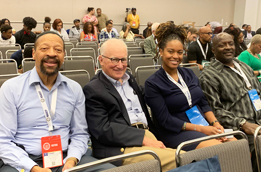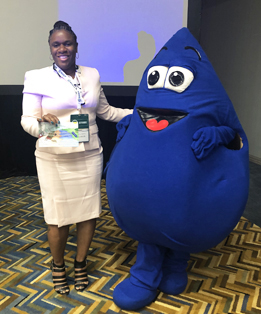|
NAACP National Convention Notes
By Sasha Dailey
Special to The Truth
On July 23, the NAACP hosted Water as a Human Right Workshop
during the organization’s national convention in Detroit
Michigan. Alicia Smith, Freshwater Future Associate Policy
Director, described water contamination and quality for the
Great Lakes Region as a guest for The Environment Climate
Justice Panel.
Along with colleagues from Flint, Detroit, and other areas
of the region, in a forum moderated by Mustafa Santiago Ali,
Smith provided detailed information regarding harmful algal
blooms (HABS) and lead and perchlorates (PFAS) contamination
throughout the Great Lakes Region. Each panelist shared
stories of Environmental and Climate Justice as it relates
to infrastructure and public health.
“It is essential that we provide a toolkit of information,
resources and communications to our communities regarding
water toxins and climate resilience, Toledo experienced
several days without water in 2014. Flint and Detroit are
still suffering from lead, PFAS and water shutoffs that
threaten the lives of all of our loves ones,” said Smith
“The Rose that Grew from the Concrete needs Fresh water to
Grow” (Tupac Shakur) a beautiful mural can be viewed on
Junction and Dorr sponsored by Junction Coalition and
painted by community artist Christopher Rodriguez, designed
by our own David Ross of Toledo Art Museum, inspired by
Junction Coalition Circles & Verses Youth (funded by Lucas
County Juvenile Court).
Toxins are a national disaster, and it’s important that we
see movement in policies which address these complex issues.
Smith went over issues pertaining to exactly what the
danger in the water could do to you. The seriousness of this
situation leads directly to brain degeneration and other
health risks, Alzheimer’s Disease, Lou Gehrig’s Disease, and
Parkinson’s Disease.
|

Toledo NAACP President Ray Wood,
Former Mayor Carty Finkbeiner,
Brittany Jones, Darryl Jones

Alicia Smith
 |
|
The toolbox to the issue is making the change, she
emphasized. She stressed the importance of getting involved
with community education, green infracture, green
technology, civic ecology education, rural/ urban
collaboration, policy education, and information sharing.
Smith also addressed building relationships, overall
partnerships with local state, regional, and
federal/authorities.
During the panel discussion, a commitment to Act on Our
Liberation and transformation now and after the climate
crisis was made, which meant giving ourselves a chance to be
a part of the change we want to see. |